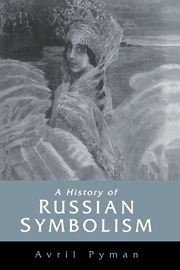Book contents
- Frontmatter
- Contents
- Preface
- Acknowledgements
- Note on the text and list of abbreviations
- Prologue: decadence or rebirth? The European fin de siècle and the Russian precursors
- Part 1 The art of the cell
- Part 2 Collective creation
- Part 3 Gleams of paradise
- Part 4 A glittering hell
- Part 5 Our home from the beginning
- Epilogue
- Chronology
- Notes
- Bibliography
- Index
Epilogue
Published online by Cambridge University Press: 08 January 2010
- Frontmatter
- Contents
- Preface
- Acknowledgements
- Note on the text and list of abbreviations
- Prologue: decadence or rebirth? The European fin de siècle and the Russian precursors
- Part 1 The art of the cell
- Part 2 Collective creation
- Part 3 Gleams of paradise
- Part 4 A glittering hell
- Part 5 Our home from the beginning
- Epilogue
- Chronology
- Notes
- Bibliography
- Index
Summary
Я — не первый воин, не последний,
Долго будет родина больна …
Александр БлокThe squabbles soon simmered down. New alliances were formed and old ones grew steadily more threadbare.
Viacheslav Ivanov continued the friendliest of correspondences with Briusov, though he blamed him severely – particularly during his period of bureaucratic service to Soviet power – for reneging on Symbolist responsibility and squandering his talent. Briusov died in 1924 and Ivanov, at the request of his widow, wrote a beautiful and thoughtful poem in memoriam.
Blok made his peace with the Merezhkovskys, then shied away from Ivanov whose Baroque ‘atmosphere’ became ‘unthinkable’ for him in the gloomy years leading up to the First World War. In 1912, he addressed a poem to him, still full of admiration, but declaring that he no longer saw him as ‘a friend’ as he had in the days of revolution. Ivanov replied imperturbably, sub specie aeternitatis: ‘Pust′ vnov′ – ne drug, o moi liubimyi, / No bratom budu ia tebe / Na veki vechnye, v rodimoi / Narodnoi mysli i sud′be’ (‘Let it be so again – not a friend, beloved, / But a brother I will be to you / To all eternity, in our native / People's thought and fate’). Bely never quarrelled seriously with Blok or Viacheslav again. He continued to stay with Ivanov at the Tower when he came to Petersburg until both poets again began to spend long periods abroad and Ivanov, in 1913, moved to Moscow.
- Type
- Chapter
- Information
- A History of Russian Symbolism , pp. 337 - 342Publisher: Cambridge University PressPrint publication year: 1994



